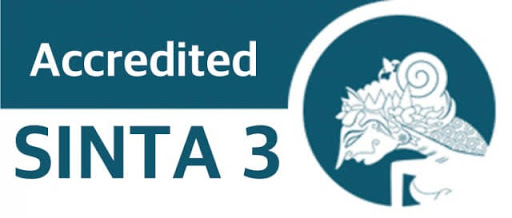Perception of hotel industry partner towards the vocational high school students' internship performance
DOI:
https://doi.org/10.12928/ijei.v2i1.3956Keywords:
hotel industry, internship, internship performanceAbstract
This research is motivated by the fact that there are still many graduates of the hotel expertise vocational school who have not been employed in the hotel industry because the competencies possessed by the graduates are not in line with the market needs. This study aims to: (1) describe the students' performance in the internship program of SMKN 1 Sewon; (2) analyze perceptions of the partner hotel industry on the internship performance of SMK 1 Sewon Bantul students. This research method used a qualitative descriptive approach. The research subjects consisted of seven hotel industries in Yogyakarta. The data sources used primary and secondary sources. Primary data sources were obtained from interviews. Secondary sources were obtained from literature, observation, and documentation. The sampling technique used purposive sampling. The data validity used triangulation, and the data analysis used a qualitative approach by Milles and Huberman. The results of the study concluded that: (1) the performance of internship in the hotel expertise program of SMKN 1 Sewon Bantul was in the excellent category; (2) The perception of the hotel industry partners on the internship performance of SMKN 1 Sewon Bantul students was very good. It was shown by the summary of the results obtained by the assessment in the category of very good with an average of 96.00%. It means that the hotel managers perceive the performance of intern students are categorized as very good and good starting from appearance, speech, mastery of competence, attendance, completing tasks, obeying an order, communication, using tools or facilities, and completing tasks according to procedures and on time.
References
Arga, P. (2015), Praktik Kerja Lapangan (PKL) Sekolah Menengah Kejuruan, Jakarta: Direktorat Pembinaan Sekolah Menengah Kejuruan, Kementerian Pendidikan dan Kebudayaan.
Baatafi. (2006). Housekeeping Departement Floor & Public Area. Bandung: Alfabeta.
Dinyati. (2015). Belajar dan Pembelajaran di SMK. Jakarta: Rineka Cipta.
Hamidah, S. (2014). Pengaruh self-efficacy, lingkungan keluarga, dan lingkungan sekolah terhadap minat berwirausaha siswa SMK jasa boga. Jurnal Pendidikan Vokasi UNY, 4(2), 195-207.
Kananto, A. (2015). Efektivitas Pelaksanaan praktek kerja industri Kelas XI di SMK Marsudi Luhur I Yogyakarta. Tesis. Yogyakarta: Universitas Negeri Yogyakarta.
Kuntadi, M. (2017). Pedoman Praktik Kerja Lapangan (PKL). Jakarta: Direktorat Menengah Kejuruan.
Miles & Huberman. (2014). Qualitative Data Analysis (A Methods Sourcebook). Sage Publication.
MOEC. (2013). Undang-Undang Nomor 20 Tahun 2013. Jakarta: Sekretariat Negara RI.
Moenir, A. S. (1983). Pendekatan Manusiawi dan Organisasi terhadap Pembinaan Kepegawaian. Jakarta: Gunung Agung.
Mulyadi, A. (2016). Efektivitas praktik kerja industri sesuai dengan tuntutan dunia kerja. Tesis. Yogyakarta: Universitas Negeri Yogyakarta.
Slamet. (2013). Pegembangan SMK model untuk masa depan. Jurnal Cakrawala Pendidikan, 22(1), 14-15.
Sudiyanto. (2011). Teaching Factory di SMK ST. Mikael Surakarta. Yogyakarta: Fakultas Teknik Universitas Negeri Yogyakarta.
Suwithi, N.W. (2008). Akomodasi Perhotelan Jilid 2. Jakarta: Direktorat Pembinaan Sekolah Menengah Kejuruan.
Syahroni, F. (2014). Persepsi siswa terhadap manfaat pelaksanaan praktik kerja industri di SMKN 1 Lembah Gumanti. Jurnal Administrasi Pendidikan UNP, 2(1), 275-831.
Widyastuti, E. R., Santosa, B., & Sayuti, M. (2020). Perception of car workshop partners towards the vocational students' internship performance in Cilacap. International Journal on Education Insight, 1(2), 61-68.
Wiyasha, I. B. M. (2007). Akuntansi Manajemen untuk Hotel dan Restoran. Yogyakarta: Andi Offset.
Downloads
Published
How to Cite
Issue
Section
License
Copyright (c) 2021 Samsiwihati Samsiwihati, Bambang Nur Achsan, Budi Santoso

This work is licensed under a Creative Commons Attribution-ShareAlike 4.0 International License.
Authors who publish with this journal agree to the following terms:
- Authors retain copyright with the work simultaneously licensed under a Creative Commons Attribution License that allows others to share the work with an acknowledgement of the work's authorship and initial publication in this journal.
- Authors are able to enter into separate, additional contractual arrangements for the non-exclusive distribution of the journal's published version of the work (e.g., post it to an institutional repository or publish it in a book), with an acknowledgement of its initial publication in this journal.
- Authors are permitted and encouraged to post their work online (e.g., in institutional repositories or on their website) prior to and during the submission process, as it can lead to productive exchanges, as well as earlier and greater citation of published work (See The Effect of Open Access).




